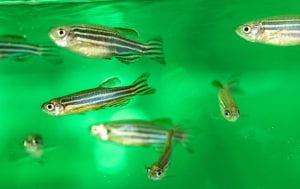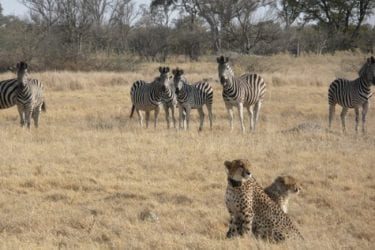News and Events
AALAE Diving Deeper Enrichment for Zebrafish

April 24th 11:00 am-12:00 pm
Learn more about enrichment for zebrafish in a webinar hosted by the American Association of Laboratory Animal Enrichment (AALAE). The webinar will explore the intricacies of zebrafish enrichment and how understanding their preferences can significantly impact their overall welfare, research outcomes, and ethical standards.
Additional information, including a zoom link, can be found here.
Impact of climate change on activity levels of African carnivore species

“Changing temperatures can impact the behavior patterns of large carnivore species and also the dynamics among species,” said University of Washington biologist Briana Abrahms, a study co-author.
In an investigation of the impact of climate change on the activity levels of four large African carnivore species (lions, leopards, cheetachs, and African wild dogs), it was determined that most species became more active at night and their activity levels reduced with increasing temperature. This effect was most prominent in cheetahs, which are typically hunt during the daytime, but they were found to shift their activity toward dawn and dusk hours during warmer weather.
Unfortunately for endangered cheetahs, that sets them up for more potential conflicts with mostly nocturnal competing predators such as lions and leopards, according to the authors of the research study, in the journal Proceedings of the Royal Society B.
A Deeper Look into the New Weight Loss Drugs
 Newly approved drugs that induce weight loss like Ozempic, Wegovy, and Zepbound, are viewed by some as the “magic pill” they’ve been waiting for. However, there can be unwanted side effects and the weight loss does not appear to be permanent unless the patients continue to take the drug. In their recent commentary, UW researchers Dr. Michael Schwartz and Sophie Yang Gou, discuss how these drugs are thought to work, the body’s adaptation and response to the weight loss, and financial and ethical considerations for society.
Newly approved drugs that induce weight loss like Ozempic, Wegovy, and Zepbound, are viewed by some as the “magic pill” they’ve been waiting for. However, there can be unwanted side effects and the weight loss does not appear to be permanent unless the patients continue to take the drug. In their recent commentary, UW researchers Dr. Michael Schwartz and Sophie Yang Gou, discuss how these drugs are thought to work, the body’s adaptation and response to the weight loss, and financial and ethical considerations for society.
UW researcher slows down hummingbirds to study them
 Alejandro Rico-Guevara has dedicated his life to looking at Hummingbirds in ways other people can’t. What he’s learned changed the world’s understanding of hummingbirds and, at times, has been of great use to humans.
Alejandro Rico-Guevara has dedicated his life to looking at Hummingbirds in ways other people can’t. What he’s learned changed the world’s understanding of hummingbirds and, at times, has been of great use to humans.
Credit: Courtesy of Ben Henwood
Animal Care, Outreach, and 3Rs Program (ACO3Rs)
 At the University of Washington Animal Care, Outreach, and 3Rs Program (ACO3Rs), our mission is to advance both science and the well being of animals through innovative research, benevolent care, and informative outreach, while championing the principles of the 3Rs: Replacement, Reduction, and Refinement.
At the University of Washington Animal Care, Outreach, and 3Rs Program (ACO3Rs), our mission is to advance both science and the well being of animals through innovative research, benevolent care, and informative outreach, while championing the principles of the 3Rs: Replacement, Reduction, and Refinement.
By embracing our core values and principles, we aspire to be a leading force in promoting ethical and humane treatment of animals, fostering scientific progress, and cultivating a compassionate society
Reporting Animal Welfare Concerns
 The University of Washington investigates any allegations of suspected misuse of animals or deficiencies regarding the care and use of research or teaching animals. To make a report or discuss a concern or perceived problem, please submit a concern.
The University of Washington investigates any allegations of suspected misuse of animals or deficiencies regarding the care and use of research or teaching animals. To make a report or discuss a concern or perceived problem, please submit a concern.
Fast Facts
Did you know?
There are nearly 300 specialized research centers or institutes at the UW.

